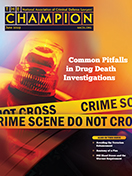June 2019

What are the common pitfalls in drug death investigations? What guidelines should medical examiners and coroners follow when conducting a drug death investigation?
Articles in this Issue
-
A Dose of Reality: Drug Death Investigations and the Criminal Justice System
Due to the increased push for prosecutions in drug-related deaths, it is more important than ever for criminal justice system stakeholders to have access to accurate, standardized, and professional death investigation and death certification. Amy Hawes and Denise Martin share some of the common pitfalls in drug death investigations, discuss national recommendations for coroner and medical examiner investigations, and set forth the qualifications death investigation experts should possess.
-
Affiliate News
What events are NACDL affiliates hosting this month? Find out here.
-
Anatomy of a Plea
Trials are diminishing at all levels. Guilty pleas are the foundation of the criminal justice system. Exhaustion and helplessness work to wear down criminal defendants throughout the pretrial process. Seeing packed courtrooms and hearing that the prosecutor “lost the file” – which requires the case to be adjourned until a later date – have a nontrivial effect on a defendant’s decision-making. Also, pleas are frequently sold to defendants as the best alternative to an intractable situation. What are the solutions?
-
Avoiding the Terrorism Enhancement
Section 3A1.4 of the Sentencing Guidelines – the so-called “terrorism enhancement” – is an obstacle for defense practitioners. If applicable, the enhancement can drive a defendant’s sentence upward by a large amount. Unfortunately, the terrorism enhancement treats all offenders the same without considering their actual conduct or individual backgrounds. This article discusses two cases and the role the facts played in the applicability of the terrorism enhancement.
-
Book Review: Mississippi Reckoning by Mitchell Zimmerman
This month Natman Schaye reviews Mississippi Reckoning by Mitchell Zimmerman.
-
Cross Country: Form Follows Function, Favors Folders
Which is better – folders or witness notebooks – for assembling cross-examination files? Organizing cross-examination in individual topic folders, including any potentially necessary documents, provides flexibility and dependability.
-
From the President: Locking Up Human Decency
Incarcerated individuals are entitled to a basic standard of care, but stories of subhuman conditions still abound in the media. Defense attorneys perhaps can obtain additional doctor visits or proper medication. The fundamental abuses, however, are harder to combat.
-
Mr. Mitchell Goes to Washington: Blood Draws, Drunk Driving, and the Warrant Requirement
What is at stake in Mitchell v. Wisconsin? This case is about the constitutionality of statutes permitting a warrantless blood draw from an impaired driver who is unconscious.
-
Supreme Court: Garza v. Idaho: Preserving the Client’s Choice to Appeal
What should a defense attorney do when a client pleads guilty, signs an appeal waiver, and then wants to appeal after sentencing? Obey the client and file a notice of appeal.
